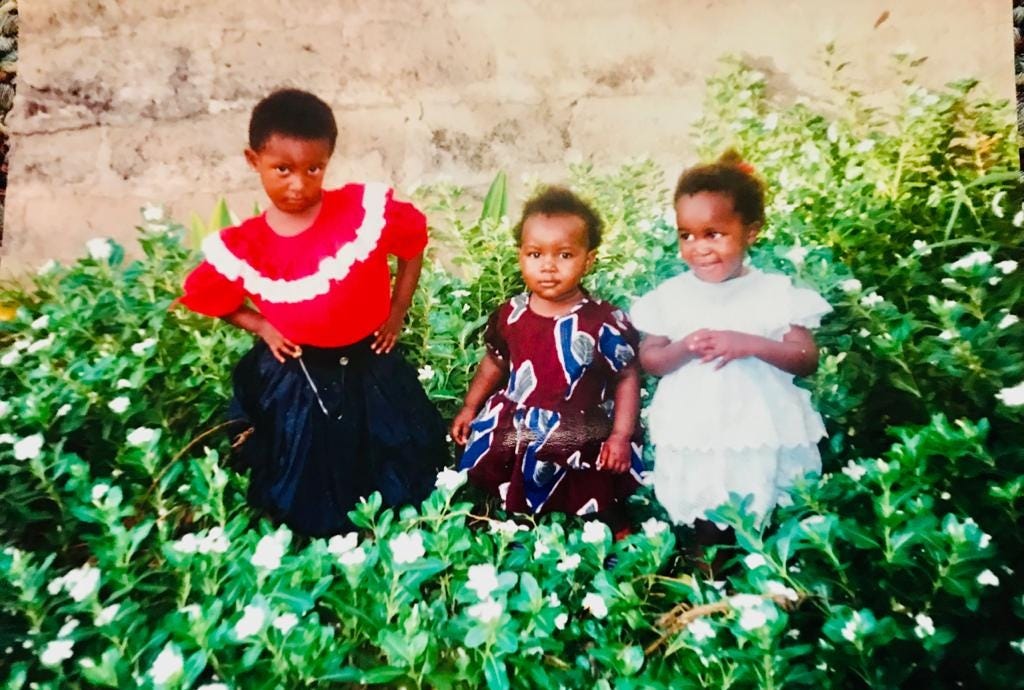From Resistance to Romance: A Language Love Story
Part of starting over is reidentifying.
Reimmersion.
Recommitting to future you so that past you isn't so salty about what it gave up.
I have always had a love-hate relationship with my mother tongue, Kiswahili. Kiswahili for me, was like the adult who forced you to sit at the table until you finished everything that was on your plate.
A constant tussle.
A tug-of-war between acceptance and defiance.
I always chose the latter.
My relationship with Kiswahili started off light, fluffy even. I would sing sweet lullabies with Baba and siblings- Zoom zoom zoom, nyukulia we.. every night before bed, and that time was always so sacred.
Kiswahili was our secret language.
The one we'd use to inadvertently teleport to a faraway land called Tanzania. A place we never fully understood, yet trusted.
It was familiar.
Cozy.
A distant lover.
An unravelling of the journey our parents kept intimately knit to themselves.
The relationship only grew, as we b
egan to know Kiswahili better. Those lullabies developed into hymns that traversed language and connected dots that were otherwise void.
It was our in.
Acceptance in its purest form.
And it was an escape. To the only place that could hold us when the world wasn't ready to.
Cue Ni tabibu wa karibu— the great physician is near. Our go to for every Tanzanian sharehe1- grand or small. Funeral or party.
My sister and I were always ready.
To share our Kiswahili lessons with pride and fervor. To mimic every note with the passion that we saw in our elders.
To show them that
we,
too,
remember.
That tuko pamoja even when we can't decipher the sermon. And then somewhere along the way, things changed.
Kiswahili started becoming more demanding.
More suppressive.
Less accepting.
There became a rift in what we sang and who we were becoming.
Kiswahili wasn't interested in learning the full story. The expectations became too high and unattainable. Or perhaps unattractive to those of us seemingly trying to attain.
I started to resent Kiswahili.
To reject.
And dismiss.
Kukaa kimya2 because listening began to teach me more. I no longer wanted to engage. Because then I felt complicit in Kiswahili's chokehold.
Enter Stage Left >> The emergence of Bongo Flava.
More than music; it was deeply rooted connection.
Uhuru.
A chance to become.
To embody the words without comparison or shaming. I became consumed.
Lady Jaydee. Ali Kiba. ProfessorJay. Vanessa Mdee. Those became my new lullabies; and exposed me to remixed versions of how Tanzanians can show up in the world. Because we are in fact not a monolith.
The lyrics had range, pulse, and depth. Storytelling to a beat. Revealing our inner struggles, community woes, and plight towards a dreamy kind of love. They spoke to me. A teenager at the time navigating my own adolescent blues.
Giving me the words when I didn't have them.
Reigniting my estranged relationship with Kiswahili.
Nowadays, my ear hears Kiswahili differently.
She is a song.
Full of life.
Fueled by her past and steaming towards a bright future.
Unapologetic. Spicy. FlavorFULL. Alluring. A magic potion.
And I'm under the spell.
This renewed intimacy with Kiswahili has followed me into adulthood in unexpected ways. Dating here has gotten me into some precarious scenarios all because of Kiswahili's unique charm.
Because sometimes you can't translate upendo3.
You can't translate matusi4.
You can't translate the metaphors and soliloquies that are covertly entrenched.
And I am in awe.
Hypnotized.
A r o u s e d.
I'm no longer at odds with Kiswahili.
I've become a student who wants to learn from her teacher.
And in this relearning, I've found a piece of that future self I'm recommitting to - one who embraces rather than resists the beautiful complexity of
who
I
am.
party/gathering
to sit quietly/silently
love
insult





